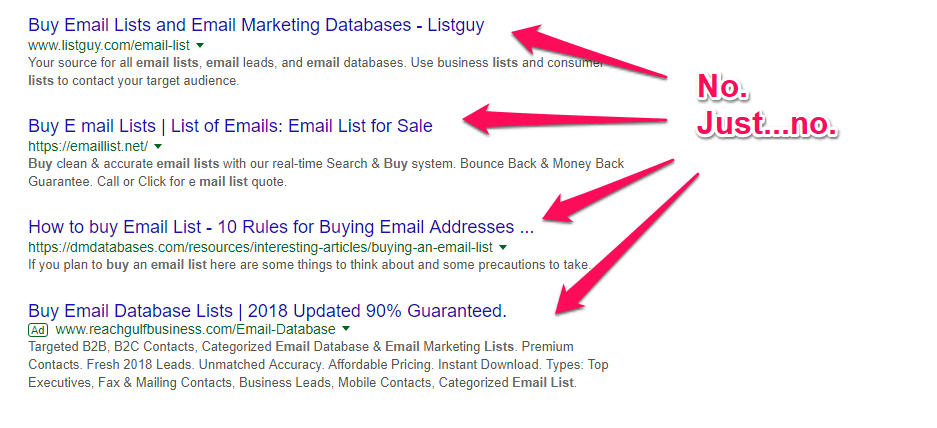20 Excellent Ideas For Deciding On Email List Sellers
Wiki Article
What Should I Think About When Purchasing Cpa Email Lists?
Consider the following aspects before buying an email list of CPAs (Certified Public Accountants):1. The list must be compliant with all legal requirements and relevant to marketing goals. What to look for: 1. Data Quality and Accuracy
The source of the data: Check the source of the information. Reputable providers typically gather information from trusted sources, such as professional directories, trade associations or databases. Avoid lists created by scraping data, or using methods that are not reliable, since they could contain inaccurate and outdated data.
Verification Process: Ensure your email list has been recently validated. This reduces bounce rates and makes sure you're reaching valid, active emails. Ask how often the list is maintained and cleaned, since CPAs can frequently change job or company.
Segmentation/Filters CPA Lists should have filters and segmentation options. CPA List should have options to segment by geography (city province or country) and areas of specialization (e.g. accounting, auditing or financial planning) or the number of years in business, or the size of the business. Your ads are more effective by using targeted targeting in light of the above factors.
2. Legal Regulations
Data Privacy Laws â Ensure that your email lists comply with privacy laws governing data such as the General Data Protection Regulation, the California Consumer Privacy Act or any other local regulations. Lists must only contain emails obtained legally.
Conformity with the CANSPAM Act To ensure compliance with the CANSPAM Act which governs commercial emails It is essential that your email list conforms to the CANSPAM Act. This includes opt-out features and refraining from deceptive subject or content. Failure to comply with the law may be punished with fines and legal issues.
Opt in Consent. Ensure you obtain email addresses via opt-in consent, i.e. recipients agreeing to receive emails. This will increase engagement and reduce complaints about spam.
3. Provider Reputation
Examine the credibility of the company. Review case studies, reviews and testimonials to assess the experiences of customers who have used them before. Proven providers with an established track history are more likely to provide quality and reliable information.
Transparency. Providers should be open about the method by which they collect their data and when they update it. If the provider's methods are not clear, that is a major red signal.
Customer Support: A reliable and dependable support service is vital in case you need assistance creating lists, troubleshooting or understanding the compliance requirements. Good support can save time and effort in the course of your campaign.
4. Cost and Return on Investment
Pricing Models. Different providers offer distinct pricing models. Some charge per contact, whereas others charge a flat rate or subscription. Compare the costs against the expected ROI, and balance price with the standard of the selection.
Find out about the refund policy. If there is a large number incorrect or inactive email addresses, many services offer a return or refund policy. A guarantee can provide security.
Don't focus on price by itself. A list's price might be attractive but it could result in low engagement or high bounces if its quality is low. Pay for lists which offer data accuracy and segmentation.
5. Ownership of Data, Usage of Data, and Access
Multi-Use Vs. Single-Use: Decide if you'll buy the list once, or if you will own it and use it for future campaigns. While a single-use list might be cheaper, owning your list lets you run long-term marketing campaigns.
Shared Lists: Find out if the list is solely yours or shared with multiple buyers. Shared lists: Determine if this email list is solely yours or is shared by several buyers. Shared lists can lead to exhaustion of the audience if they've received a lot of marketing emails.
6. Data Integration and Format
CRM Compatibility. Be sure that your list is delivered in a format that is compatible with the CRM application that you use, or for marketing via email like CSV. This will make it easy to manage of data as well as its transfer.
Ease-of-Use: Evaluate the ease at how data can be segmented and managed before integrating it into your system. A well-organized list can to make targeting and personalization more efficient.
7. Ethical Questions
Relevance of Content: CPAs are busy professionals It's crucial to send relevant, quality-driven content. Beware of sending emails that are irrelevant and can harm your reputation or create spam complaints.
Avoid over-emailing: Be aware of how often you contact people on your list. Insufficient communication could lead to unsubscribes and spam complaints that can damage the reputation of the sender.
Conclusion
To ensure that your investment is worth it, you must consider the quality of data and legal compliance when you purchase an email database from an CPA supplier. Segmentation and targeting as well as ethical practices will maximize engagement, ROI, and brand perception. See the top cpa email list for site recommendations.

What Are The Important Things I Need To Think About Before Buying The Urgent Care Email List?
It's crucial to think about a number of factors when purchasing an email list to provide urgent treatment. This will ensure the list you purchase is up-to-date and compliant with the law and relevant to marketing goals. The most important considerations are: 1. Quality of data and accuracy
Source of Data: Make sure the information is sourced from reliable sources for example, medical associations, healthcare databases or professional directories. Avoid lists made by scraping, or any other method that might not be reliable, as they may contain inaccurate data.
Verification: Make sure that the email list was regularly updated. A reliable supplier will have a rigorous validation process to remove invalid or out of date email addresses. This ensures that you receive an excellent delivery rate and lowers bounce rate.
Segmentation and Targeting: The segmentation should include information such as the area of the clinic (e.g. city or state or region) as well as its size and any specific areas of expertise (e.g. diagnostics or pediatrics) and roles of key decision-makers (e.g. doctors or practice owners, etc.). The lists that are targeted will increase the reach of your outreach and boost engagement.
2. Legal Regulations
Data Privacy Laws : Ensure that your list is compliant with the applicable data protection legislation, such as in Europe the General Data Protection Regulation, in the U.S. the California Consumer Privacy Act and any other local laws. Email addresses need to be legally collected and subject to consent.
Conformity to the CAN-SPAM Act: In the U.S., your email marketing campaigns must be in compliance with the CAN-SPAM Act. This means providing a clear opt-out mechanism, avoiding untrue subject lines, as well as include your physical address in email messages. Failure to comply could result in fines or damage to the image of your brand.
Opt-In Consent: Check to see if the email addresses on the list have been received with explicit opt-in permission in which the recipient has agreed to receive third-party marketing communications. This minimizes spam complaints and legal issues.
3. Provider Reputation
Established Providers: Look for a company that has a long history of providing email lists that are high quality and compliance. You can evaluate a provider's reliability by looking at reviews, testimonials, and cases studies.
Transparency. The provider should provide transparency about the data source and frequency of updates. If the company isn't able to provide an exact explanation of the method they use to collect data, this could indicate the data they've collected is of poor quality.
Customer Support: A strong support staff is vital in case you need assistance in tackling technical issues as well as list customization or conformity. A customer-friendly service is able to assist you in getting the most value from your list.
4. Cost and Return on Investement (ROI).
Pricing Models: Email lists suppliers typically offer different pricing models such as pay-per-contact and flat costs. It is recommended to evaluate pricing models in relation to your marketing budget and the expected returns. Balance the cost of the list with the validity and accuracy of the data.
Refund or Replacement Policy: Trustworthy service providers usually offer an option to return or replace the item in the event that a substantial part of the email addresses are not valid or inaccessible. Before buying, make sure you are aware of the conditions of the policy.
Cost-effective: Concentrate on lists that are valuable by using accurate information and segmentation. Making investments in top-quality lists can increase engagement and improve the return on investment.
5. Use, Ownership of Data and the Use
Make use of the list only once or more than once. Lists which allow for multiple uses are more valuable. This is particularly true in the event that you intend to run ongoing campaigns.
Exclusive vs. Lists shared: Determine the list's exclusivity or shared. A shared list could cause fatigue in recipients, who might receive messages from multiple businesses.
6. Integration and Data Format
CRM Compatibility. Check that your email list is delivered in formats compatible with the software you are using to manage your email marketing or customer relationship management, like CSV or Excel. This will facilitate the smooth integration of your marketing campaigns.
Accessibility: The email list should be easy to maintain and segment based on your specific criteria. A well-organized list of email addresses makes targeting and personalization easier.
7. Ethical Considerations
Relevance: Professionals in urgent care can be busy so you must ensure that your content is relevant and useful. Your messages should be customized to meet their needs. This could include medical equipment, technology for healthcare or other supplies closely linked to urgent care operations. Unrelated content could damage your brand reputation and decrease engagement.
Be cautious about the frequency with which you send emails. Sending excessive amounts of emails or spam messages can lead to complaints about spam and harm your reputation.
The conclusion of the article is:
When you purchase an urgent care email list, focus on the accuracy of data as well as legal compliance. the reputation of the company. Lists should be segmented regularly and must adhere to data privacy regulations. By delivering targeted information and investing in a well-designed quality mailing list you will increase the number of people who respond and earn a decent return on your investment. Read the top rated urgent care email list for more guide.
